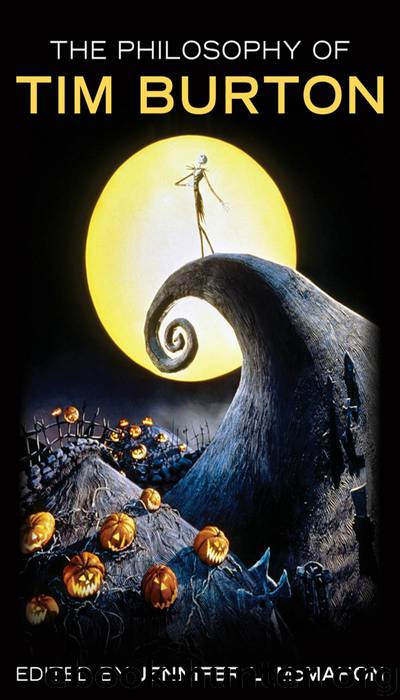The Philosophy of Tim Burton by McMahon Jennifer L

Author:McMahon, Jennifer L.
Language: eng
Format: epub
Publisher: The University Press of Kentucky
Published: 2014-03-01T16:00:00+00:00
Finding Ourselves
One answer to this question is that the expressive outsider, the marginalized freak in a Batsuit, is a species doomed to extinction. Little has happened in the development of new filmic Bat-worlds to suggest otherwise. Joel Schumacher’s follow-ups to Burton’s duet were little more than camp pastiches of their predecessors. These films, though popular at the box office, had little cinematic value or depth of characterization and effectively killed the franchise. Resurrection followed in 2005 with Christopher Nolan’s trilogy Batman Begins, The Dark Knight, and The Dark Knight Rises. While the realism in the acting and cinematography of these films appeals to an older, more hardened, post-9/11 generation than Schumacher’s audience represented, the nihilism in Nolan’s vision is bleak. Burtonian comic book action has been replaced by intense violence, and major characters are killed off. Abused by his father as a child, the Joker is not even a hate-worthy character anymore, and the Batman is treated as a criminal in the mind-set of Gothamites as The Dark Knight ends. The steady erosion of values that the Batman might stand for in these films echoes the social need to be filled by philosophy in Gadamer’s thoughts: “What man needs is not just the persistent posing of ultimate questions, but the sense of what is feasible, what is possible, what is correct, here and now. The philosopher, of all people, must, I think, be aware of the tension between what he claims to achieve and the reality in which he finds himself.”43 Nolan’s Batman films have reopened all the questions put to audiences of the Batman.
A simple lesson about virtue and courage from Batman Begins also should be of interest to those of us who would take something from Burton’s Expressionist Batman films. “Why do we fall, sir?” Alfred the butler asks, invoking Bruce Wayne’s father’s advice. The answer: “So that we can learn to pick ourselves up.” Although heroes and villains are more unremitting in Nolan’s Gotham, they share the Burtonian understanding that expressive outsiders must quit their reliance on cosmic forces of justice to right the balance of good and evil and so be constantly ready to soldier on past tragedy. Burton’s unique contribution shows how individuality and imagination can assist us in considering the place of both heroes and villains, given their cultural marginalization. Burton’s reliance on artistic modes characteristic of German Expressionism and his flair for characterization and set design appeal to those of us who believe that there are alternative traditions to Hollywood bang and bluster that can be profitably reclaimed. In thinking about the philosophy of Tim Burton, we should consider the transformative and even transgressive power of the artistic imagination, and how it could be inspired among a wider cross-section of Burton’s audience.
Download
This site does not store any files on its server. We only index and link to content provided by other sites. Please contact the content providers to delete copyright contents if any and email us, we'll remove relevant links or contents immediately.
Call Me by Your Name by André Aciman(20521)
Ready Player One by Cline Ernest(14679)
How to Be a Bawse: A Guide to Conquering Life by Lilly Singh(7490)
Wiseguy by Nicholas Pileggi(5791)
The Kite Runner by Khaled Hosseini(5183)
On Writing A Memoir of the Craft by Stephen King(4947)
Audition by Ryu Murakami(4933)
The Crown by Robert Lacey(4818)
Call me by your name by Andre Aciman(4691)
Gerald's Game by Stephen King(4656)
Harry Potter and the Cursed Child: The Journey by Harry Potter Theatrical Productions(4507)
Dialogue by Robert McKee(4406)
The Perils of Being Moderately Famous by Soha Ali Khan(4221)
Dynamic Alignment Through Imagery by Eric Franklin(4218)
Apollo 8 by Jeffrey Kluger(3713)
The Inner Game of Tennis by W. Timothy Gallwey(3689)
Seriously... I'm Kidding by Ellen DeGeneres(3637)
How to be Champion: My Autobiography by Sarah Millican(3594)
Darker by E L James(3520)
